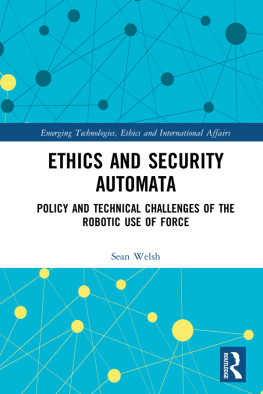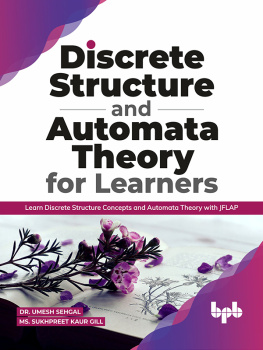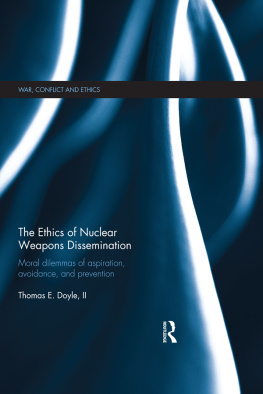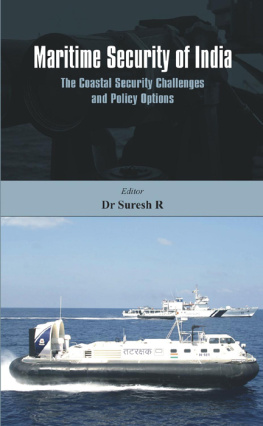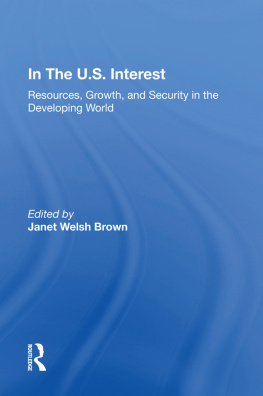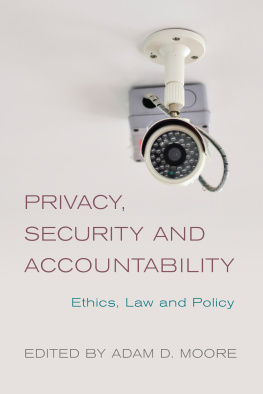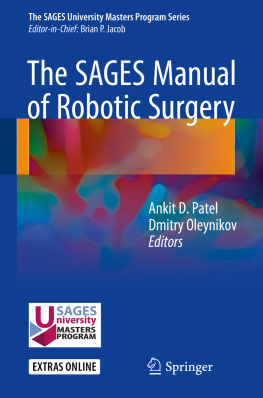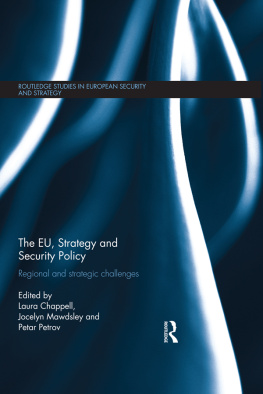Ethics and Security Automata
Can security automata (robots and AIs) make moral decisions to apply force on humans correctly? If they can make such decisions, ought they be used to do so? Will security automata increase or decrease aggregate risk to humans? What regulation is appropriate? Addressing these important issues, this book examines the political and technical challenges of the robotic use of force.
The book presents accessible practical examples of the machine ethics technology likely to be installed in military and police robots and also in civilian robots with everyday security functions such as childcare. By examining how machines can pass reasonable person tests to demonstrate measurable levels of moral competence and display the ability to determine the spirit as well as the letter of the law, the author builds upon existing research to define conditions under which robotic force can and ought to be used to enhance human security.
The scope of the book is thus far broader than shoot to kill decisions by autonomous weapons, and should attract readers from the fields of ethics, politics, and legal, military and international affairs. Researchers in artificial intelligence and robotics will also find it useful.
Sean Welsh obtained his undergraduate degree in Philosophy at the University of New South Wales and underwent postgraduate study at the University of Canterbury. He has worked extensively in software development for British Telecommunications, Telstra Australia, Volante e-business, Fitch Ratings, James Cook University, 24 Hour Communications and Lumata. He also worked for a short time as a political advisor to Warren Entsch, the Federal Member for Leichhardt in Australia. Seans articles on robot ethics have appeared in the Conversation, CNN, the Sydney Morning Herald, the New Zealand Herald and the Australian Broadcasting Corporation.
Emerging Technologies, Ethics and International Affairs
Series Editors: Steven Barela, Jai C. Galliott, Avery Plaw, and Katina Michael
This series examines the crucial ethical, legal and public policy questions arising from or exacerbated by the design, development and eventual adoption of new technologies across all related fields, from education and engineering to medicine and military affairs. The books revolve around two key themes:
- Moral issues in research, engineering and design
- Ethical, legal and political/policy issues in the use and regulation of Technology
This series encourages submission of cutting-edge research monographs and edited collections with a particular focus on forward-looking ideas concerning innovative or as yet undeveloped technologies. Whilst there is an expectation that authors will be well grounded in philosophy, law or political science, consideration will be given to future-orientated works that cross these disciplinary boundaries. The interdisciplinary nature of the series editorial team offers the best possible examination of works that address the ethical, legal and social implications of emerging technologies.
For a full list of titles, please see our website: www.routledge.com/Emerging-Technologies-Ethics-and-International-Affairs/book-series/ASHSER-1408
Most recent titles
Commercial Space Exploration
Ethics, Policy and Governance
Jai Galliott
Healthcare Robots
Ethics, Design and Implementation
Aimee van Wynsberghe
Forthcoming titles
Ethics and Security Automata
Policy and Technical Challenges of the Robotic Use of Force
Sean Welsh
Experimentation beyond the Laboratory
New Perspectives on Technology in Society
Edited by Ibo van de Poel, Lotte Asveld and Donna Mehos
First published 2018
by Routledge
2 Park Square, Milton Park, Abingdon, Oxon OX14 4RN
and by Routledge
711 Third Avenue, New York, NY 10017
Routledge is an imprint of the Taylor & Francis Group, an informa business
2018 Sean Welsh
The right of Sean Welsh to be identified as author of this work has been asserted by him in accordance with sections 77 and 78 of the Copyright, Designs and Patents Act 1988.
All rights reserved. No part of this book may be reprinted or reproduced or utilised in any form or by any electronic, mechanical, or other means, now known or hereafter invented, including photocopying and recording, or in any information storage or retrieval system, without permission in writing from the publishers.
Trademark notice: Product or corporate names may be trademarks or registered trademarks, and are used only for identification and explanation without intent to infringe.
British Library Cataloguing-in-Publication Data
A catalogue record for this book is available from the British Library
Library of Congress Cataloging-in-Publication Data
Names: Welsh, Sean, 1963 author.
Title: Ethics and security automata : policy and technical challenges of the
robotic use of force / Sean Welsh.
Description: Abingdon, Oxon ; New York, NY : Routledge is an imprint
of the Taylor & Francis Group, an Informa Business, [2018] |
Series: Emerging technologies, ethics and international affairs |
Includes bibliographical references and index.
Identifiers: LCCN 2017021957 | ISBN 9781138050228 (hbk) |
ISBN 9781315168951 (ebk)
Subjects: LCSH: PoliceEquipment and suppliesMoral and ethical
aspects. | Security systemsMoral and ethical aspects.
Classification: LCC HV7936.E7 W45 2017 | DDC 174/.93632dc23
LC record available at https://lccn.loc.gov/2017021957
ISBN: 978-1-138-05022-8 (hbk)
ISBN: 978-1-315-16895-1 (ebk)
Typeset in Times New Roman
by Apex CoVantage, LLC
This book seeks to answer two questions:
- 1) Can AI and robotic agents (automata) make ethical decisions that affect the security of human patients correctly?
- 2) Ought such decisions be delegated to automata?
The book contributes to machine ethics, robot ethics and the contemporary debate on autonomous weapons in international affairs.
Machine ethics I define as the project of making moral decisions in a Turing machine. At its core, machine ethics involves formalizing moral decisions so that they can be made by artificial intelligence (AI).
Robot ethics (or roboethics) I define as the branch of applied ethics that discusses the moral and immoral uses of robots. Typically, robot cognition (thinking) is implemented as AI.
The debate on lethal autonomous weapons systems held under the aegis of the Convention on Certain Conventional Weapons (CCW) represents an issue of robot ethics that is of particular relevance to international affairs.
Machine ethics can be seen as a technical branch of robot ethics. Having decided whether or not a certain application of a robot is lawful (the policy question), one then has to go about designing a robot that can conform to the normative policy (the technical question). Alternatively, one might investigate whether a robot can conform to legal and moral norms in the laboratory purely as a research project.
The technical question as to whether a machine can be programmed to function with moral competence in an application domain (i.e. machine ethics) is relevant to the ethical question as to whether the machine ought to be programmed to function in the application domain (i.e. robot ethics).

